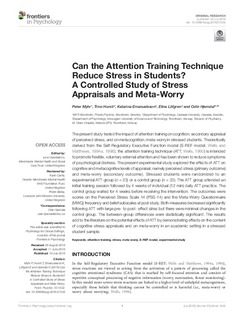| dc.contributor.author | Myhr, Peter | |
| dc.contributor.author | Hursti, Timo | |
| dc.contributor.author | Emanuelsson, Katarina | |
| dc.contributor.author | Löfgren, Elina | |
| dc.contributor.author | Hjemdal, Odin | |
| dc.date.accessioned | 2019-09-19T06:00:14Z | |
| dc.date.available | 2019-09-19T06:00:14Z | |
| dc.date.created | 2019-07-05T12:09:39Z | |
| dc.date.issued | 2019 | |
| dc.identifier.citation | Frontiers in Psychology. 2019, 10:1532 (JULY), 1-5. | nb_NO |
| dc.identifier.issn | 1664-1078 | |
| dc.identifier.uri | http://hdl.handle.net/11250/2617501 | |
| dc.description.abstract | The present study tested the impact of attention training on cognition; secondary appraisal of perceived stress, and on metacognition; meta-worry in stressed students. Theoretically derived from the Self-Regulatory Executive Function model (S-REF model; Wells and Matthews, 1994a, 1996), the attention training technique (ATT; Wells, 1990) is intended to promote flexible, voluntary external attention and has been shown to reduce symptoms of psychological distress. The present experimental study explored the effects of ATT on cognitive and metacognitive levels of appraisal, namely perceived stress (primary outcome) and meta-worry (secondary outcome). Stressed students were randomized to an experimental ATT group (n = 23) or a control group (n = 23). The ATT group attended an initial training session followed by 4 weeks of individual (12 min) daily ATT practice. The control group waited for 4 weeks before receiving the intervention. The outcomes were scores on the Perceived Stress Scale 14 (PSS-14) and the Meta-Worry Questionnaire (MWQ) frequency and belief subscales at post study. Both measures decreased significantly following ATT with large pre- to post- effect sizes but there were minimal changes in the control group. The between-group differences were statistically significant. The results add to the literature on the potential effects of ATT by demonstrating effects on the content of cognitive stress appraisals and on meta-worry in an academic setting in a stressed student sample. | nb_NO |
| dc.language.iso | eng | nb_NO |
| dc.publisher | Frontiers Media | nb_NO |
| dc.rights | Navngivelse 4.0 Internasjonal | * |
| dc.rights.uri | http://creativecommons.org/licenses/by/4.0/deed.no | * |
| dc.title | Can the attention training technique reduce stress in students? A controlled study of stress appraisals and meta-worry | nb_NO |
| dc.type | Journal article | nb_NO |
| dc.type | Peer reviewed | nb_NO |
| dc.description.version | publishedVersion | nb_NO |
| dc.source.pagenumber | 1-5 | nb_NO |
| dc.source.volume | 10:1532 | nb_NO |
| dc.source.journal | Frontiers in Psychology | nb_NO |
| dc.source.issue | JULY | nb_NO |
| dc.identifier.doi | 10.3389/fpsyg.2019.01532 | |
| dc.identifier.cristin | 1710310 | |
| dc.description.localcode | Copyright © 2019 Myhr, Hursti, Emanuelsson, Löfgren and Hjemdal. This is an open-access article distributed under the terms of the Creative Commons Attribution License (CC BY). The use, distribution or reproduction in other forums is permitted, provided the original author(s) and the copyright owner(s) are credited and that the original publication in this journal is cited, in accordance with accepted academic practice. No use, distribution or reproduction is permitted which does not comply with these terms. | nb_NO |
| cristin.unitcode | 194,67,40,0 | |
| cristin.unitcode | 1920,0,0,0 | |
| cristin.unitname | Institutt for psykologi | |
| cristin.unitname | St. Olavs Hospital HF | |
| cristin.ispublished | true | |
| cristin.fulltext | original | |
| cristin.qualitycode | 2 | |

